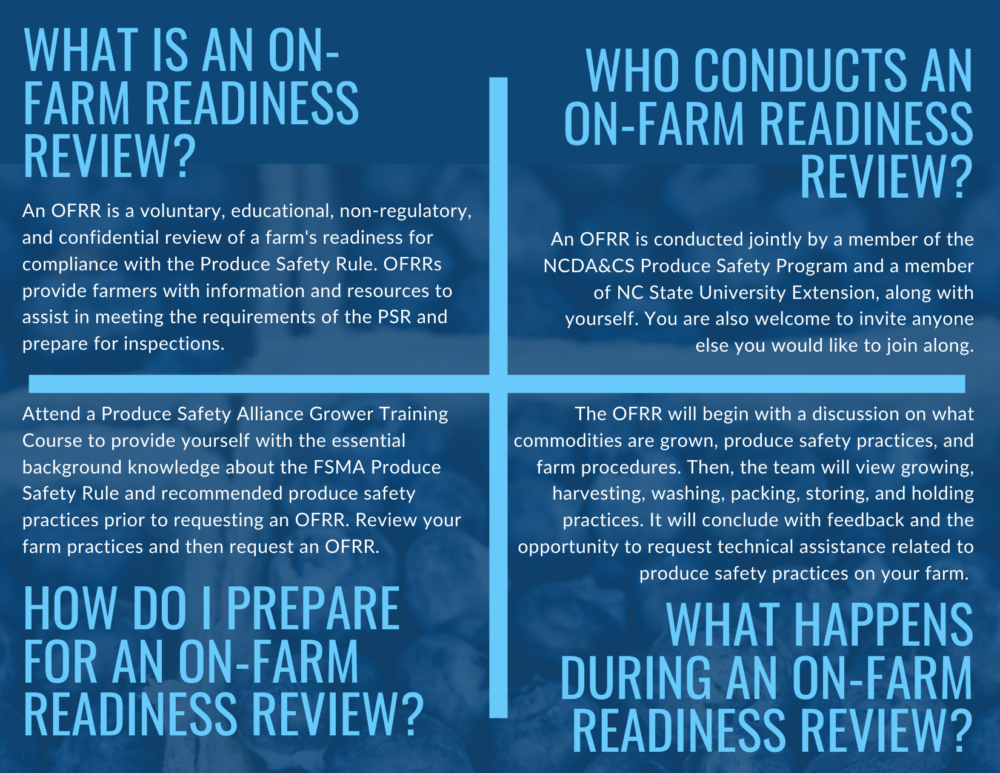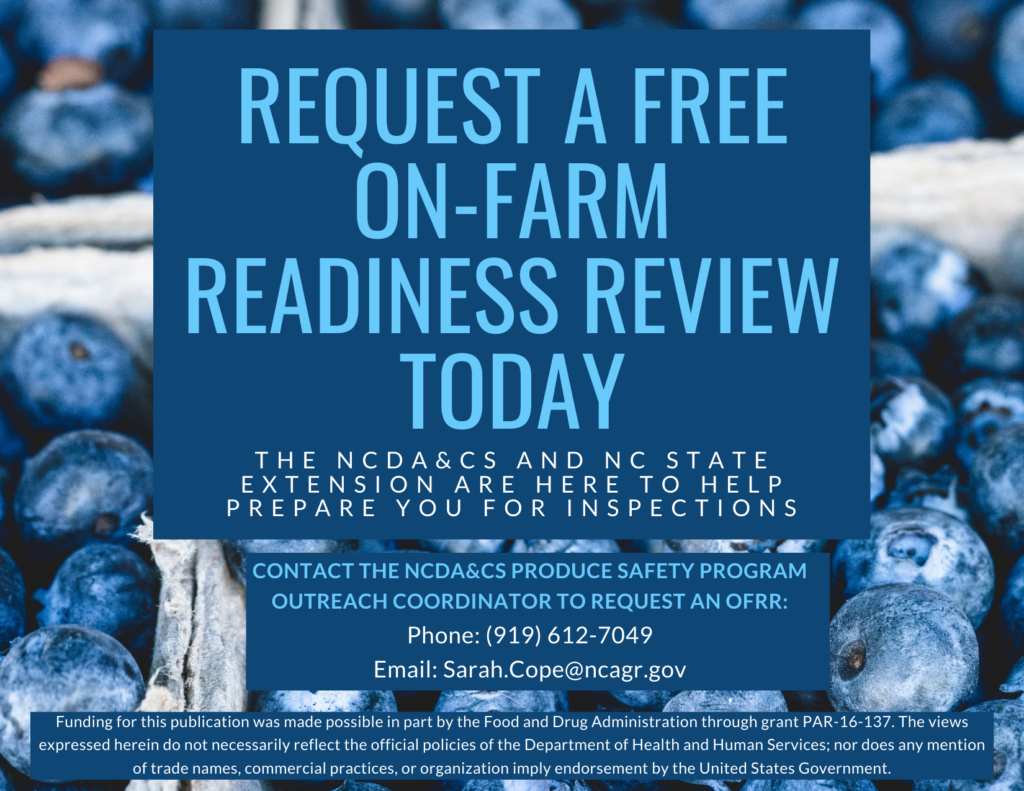by Chloe Johnson, CFSA Local Food System Manager | Tuesday, Mar. 16, 2021 —
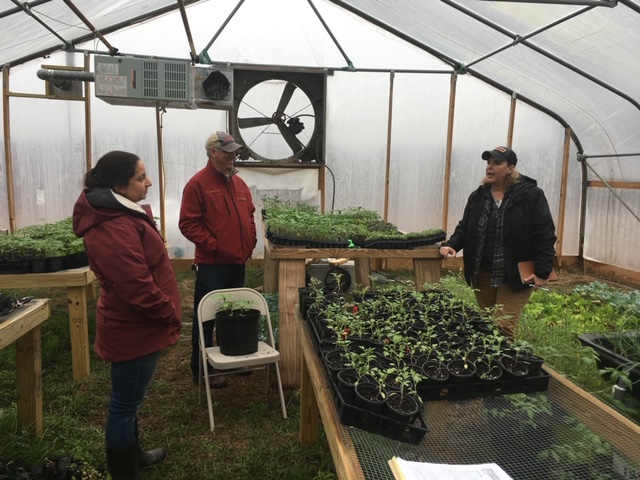
CFSA’s Kim Butz doing a farm visit at Kindlewood Farms in Walterboro, SC
The world of food safety can seem like a maze of rules and regulations. If none of your buyers have demanded that you get GAP (“Good Agricultural Practices”) certified, then maybe you haven’t yet tried to untangle that maze. You may know that the law governing food safety—the Food Safety Modernization Act (FSMA)—is different from GAP certification, but may also assume your farm is too small to have to worry about FSMA rules.
Use this tool that CFSA created to clarify whether you are really too small for FSMA rules to affect your farm.
No matter the size, it is a good idea for all farms to be familiar with FSMA’s basic produce safety rules. Remember that your status under the law can change if you sell more, or shift a significant portion of your sales to wholesale. Also, business owners have to stay on top of industry trends to protect their business investments; and FSMA outlines most of the best practices in fresh produce food safety.
It can take some brainstorming to determine how to incorporate food safety principles into your farm’s operations. Once you are familiar with the rules, it can still be difficult to determine if you are applying them appropriately. Maybe you have some old equipment that you can’t replace, but you aren’t sure if it would pass muster in a food safety audit or inspection. Or, you would like someone to view your wash station to make sure you aren’t missing any steps.
If you are GAP certified or have taken some of our GAP-certification classes, you will be familiar with general food safety principles. But if you want education specific to FSMA, your Department of Agriculture has a great resource called the On-Farm Readiness Review.
“This program might be particularly helpful for farms who think they may sell themselves into coverage under FSMA in the near future, or those that are currently expanding their infrastructure.”
Even if you are exempt or qualified exempt from FSMA, you are still eligible for a free and confidential assessment. This program might be particularly helpful for farms who think they may sell themselves into coverage under FSMA in the near future, or those that are currently expanding their infrastructure. Better to get input on food safety concerns before you are expected to be in full compliance!
I spoke with Sarah Cope, outreach coordinator for the Produce Safety Program at NCDA, to get more information about the On-Farm Readiness Reviews (OFRR) offered by the NCDA.
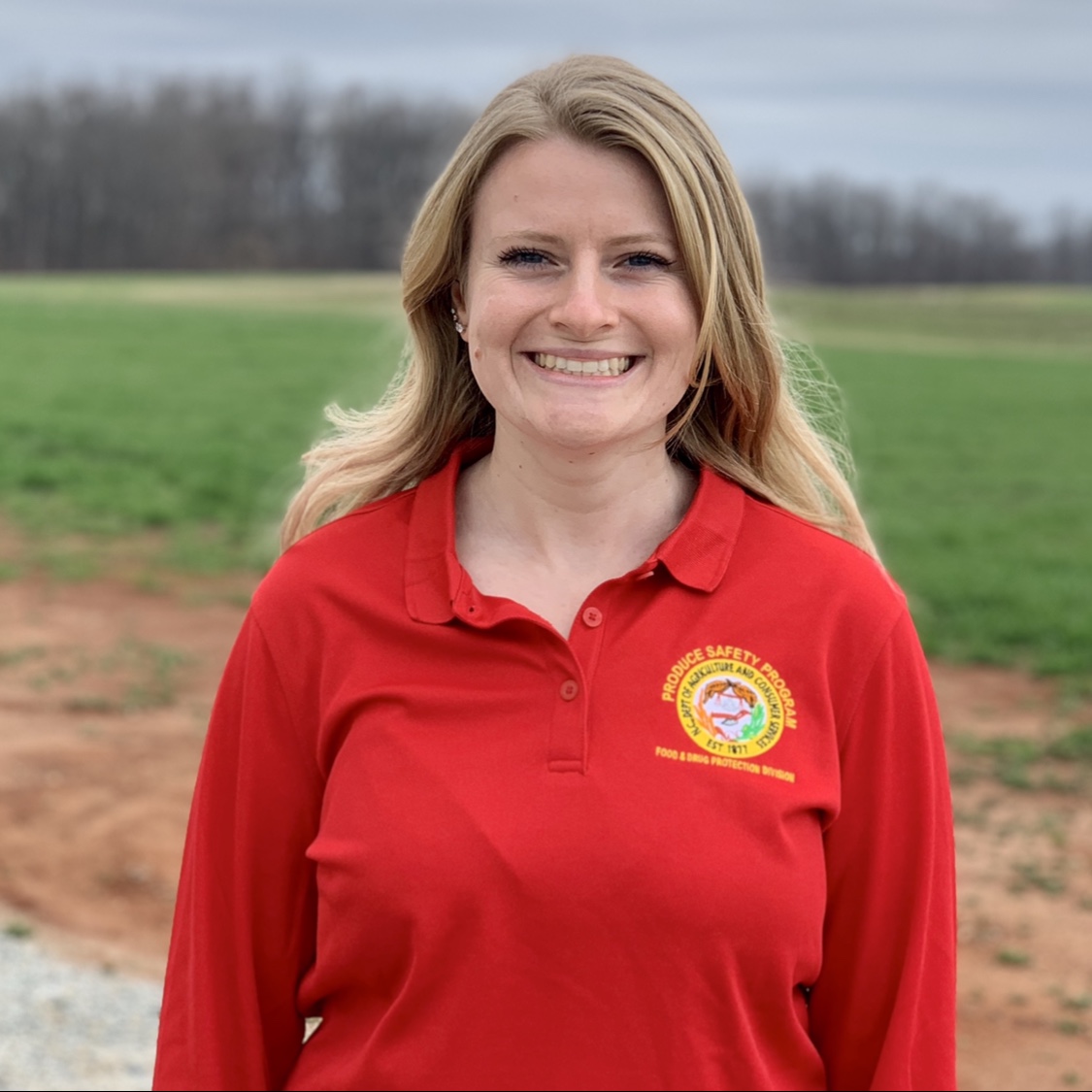 Hi, Sarah. Can you give us a quick synopsis of the OFRR Program?
Hi, Sarah. Can you give us a quick synopsis of the OFRR Program?
Sarah: An On-Farm Readiness Review is a voluntary, educational, non-regulatory, and confidential review of a farm’s readiness for compliance with the Produce Safety Rule. OFRRs provide growers with information and resources to assist in meeting the requirements of FSMA’s Produce Safety Rule (PSR) and assess for any areas of improvement regarding produce safety. They were developed by a variety of produce safety educators within the industry in order to create a situation that would be informal and conversational between the grower and the educators about the requirements of the PSR.
Can qualified exempt farms request an OFRR?
Sarah: Yes! In fact, all produce farms of any size are welcome to request an OFRR, whether they are covered under the Produce Safety Rule or not. The only catch is that the grower must attend a Produce Safety Alliance Grower Training Course to provide themselves with the essential background knowledge about the FSMA Produce Safety Rule and recommended produce safety practices prior to requesting an OFRR.
Who conducts the OFRR?
Sarah: An OFRR is conducted jointly by a member of the NCDA&CS Produce Safety Program—typically the outreach coordinator who has no regulatory role at all—and a member of the NC State University Cooperative Extension produce safety team, along with the grower. And the grower is also welcome to invite anyone else he or she would like to join along!
So no inspectors will be on-site for the OFRR?
Sarah: While I am typically the NCDA&CS representative for the OFRR, we sometimes include the local inspector for the area so that they can get to know the grower and begin to understand the produce safety practices specific to that farm. We guarantee that the inspector has removed their “regulatory hat” and put on their “education hat” when they are on an OFRR. They are just there to educate the grower about the Produce Safety Rule, not to inspect the farm.
Could a farmer invite a friend of theirs who is also trying to implement food safety practices on their own farm?
Sarah: We suggest that each grower requests their own OFRR because we like the conversation and information to be tailored specifically to the practices we are observing on the farm, in order to make it most beneficial to the grower.
Are there specific challenges you’ve seen smaller farms face complying with the FSMA Produce Safety Rule?
Sarah: Some smaller farms may not have the most up-to-date equipment or the same amount of time, money, or other resources to practice the most ideal produce safety recommendations that larger farms may have. However, the best thing about an OFRR is that it is tailored specifically to the farm and the resources that are available. The OFRR team will talk with the grower about the best ways they can reasonably take action to come into compliance with the Produce Safety Rule.
Does the grower have to pay anything to have an OFRR?
Sarah: No, it is completely free! For no cost at all, the grower will receive an OFRR manual and priceless produce safety advice at a time that is scheduled to work best for them!
How long will an OFRR last and what can a grower expect to be asked about?
Sarah: The OFRR will last about two hours and begin with a discussion on what commodities are grown, produce safety practices, and farm procedures.
Then, the team will view growing, harvesting, washing, packing, storing, and holding practices.
Lastly, it will conclude with feedback and the opportunity to request technical assistance related to produce safety practices on the farm. So, hopefully, throughout the two hours, the grower has gained a significant amount of knowledge as to why produce-safety practices are so important to implement, backed by science alongside some great advice on how to implement those practices in the future.
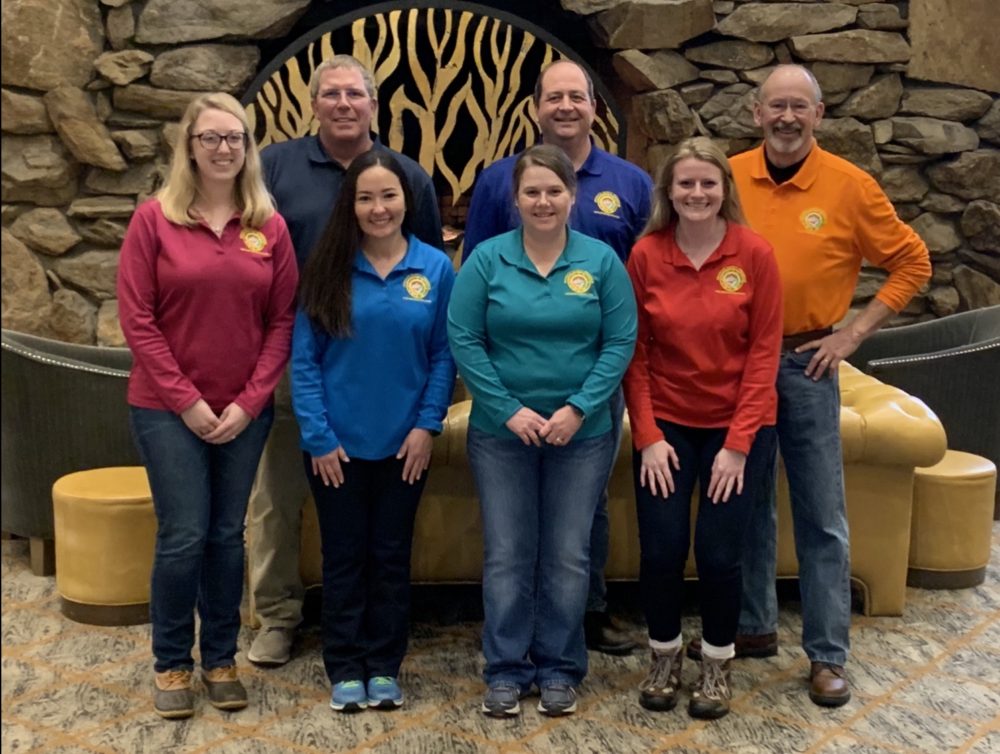
The North Carolina Produce Safety Program Team
Are OFRRs confidential?
Sarah: Absolutely! The only people who will know about the OFRR are the OFRR team. Those conducting the OFRR will not take any notes or pictures unless the grower asks them to, and in that case, they would leave them on the farm at the conclusion of the OFRR. Additionally, the name of the farm will never be mentioned in regard to state and national OFRR result data.
Are records reviewed during an OFRR?
Sarah: The OFRR team does not ask to review any records during the OFRR, but they do ask if the grower keeps records on certain topics and remind the grower that they would need to be able to provide those records within 24 hours of an inspection. Though, if the grower has any questions about their records and wants the OFRR team to look over them, the team would be happy to!
What do qualified exempt farms (not eligible to be inspected) have to do if they get a call from NCDA about a FSMA inspection?
Sarah: If someone from the NCDA&CS Produce Safety Program team reaches out to any farm inquiring about their familiarity with the Produce Safety Rule, it is just to ask them to verify their farm with us!
By verifying their farm, the grower will simply provide us with up-to-date information about the farm’s size, commodities grown, and correct contact information. This information helps us determine if the farm is eligible for an inspection, exempt, or not covered. We do not share the verification information with anyone and simply use it to keep a farm inventory and discuss the next steps for the operation, whether that is an On-Farm Readiness Review, an inspection, or simply an educational farm visit.
We can also keep the grower up to date with trainings and workshops that they might be interested in if they would like.
For Qualified Exempt (QE) farms, we ask them to confirm that they meet all the QE eligibility requirements. We also ask that they display a sign at their point-of-sale that states the farm name and address, to meet the Produce Safety Rule requirements for QE farms. Additionally, we will let them know that we will follow up in a year to ensure they are still QE.
Would participating in an OFRR have any impact on whether they are contacted by the NCDA about inspection?
Sarah: Nope, we aim to give growers ample time after an OFRR to prepare for an inspection if they are eligible. However, requesting an OFRR does not make a farm any more likely to receive an inspection. It just makes them more prepared for it when the time comes!
How many inspections for eligible farms have been done to date?
Sarah: The Produce Safety Program has been busy verifying farms and making sure all produce growers around the state are up-to-date with, and well informed about, the Produce Safety Rule. In doing so, we have conducted 38 OFRRs and 32 inspections so far! This year large, small, and very small farms are all eligible for inspection, so our team is excited to get out there and educate even more growers about the Produce Safety Rule.
Questions?
If you’re interested in learning more:
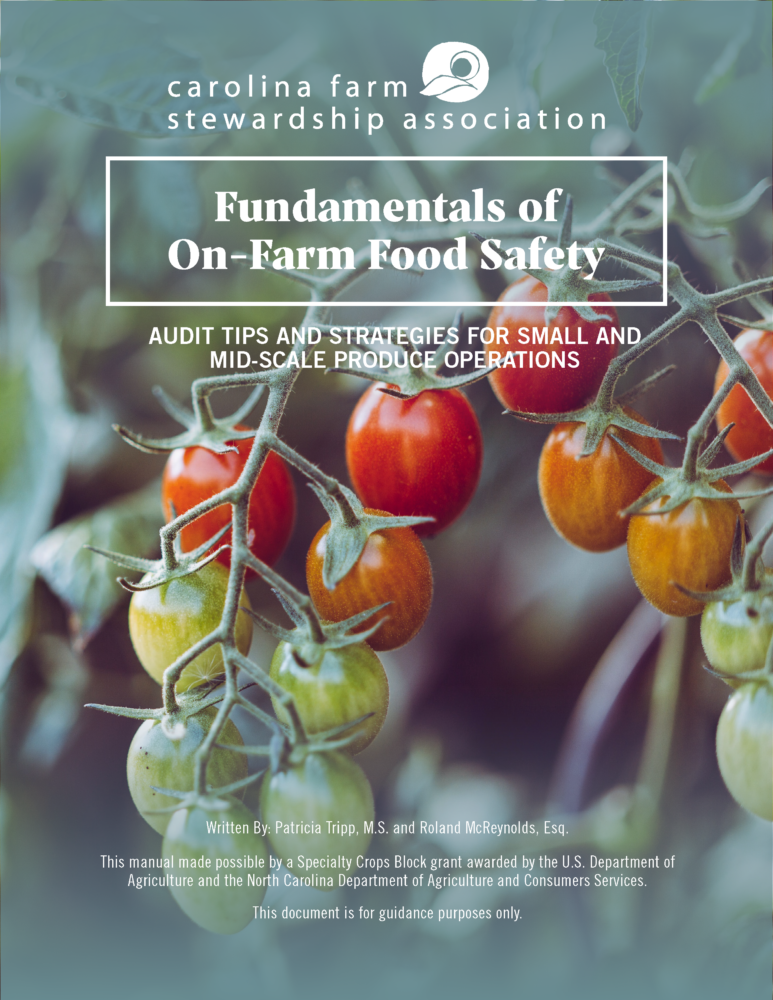
- Check out CFSA’s FSMA + Food Safety Resource Hub
- Download our Good Agriculture Practices (GAPs) Manual (.pdf)
- Attend a CFSA food safety training event
- Get direct technical assistance from CFSA to become USDA-GAP certified
- Email the article author, Chloe, at chloe@carolinafarmstewards.org
About Sarah Cope
Sarah Cope is the Outreach Coordinator for the Produce Safety Program within the North Carolina Department of Agriculture and Consumer Services. The Produce Safety Program provides support to North Carolina fresh produce farmers through education and outreach to build knowledge of the Produce Safety Rule which is in place to keep the growing, harvesting, packing, and holding of fruits and vegetables free of foodborne illness-causing pathogens for the health and safety of consumers.
Reach out to Sarah at Sarah.Cope@ncagr.gov or call her office at (919) 612-7049.



